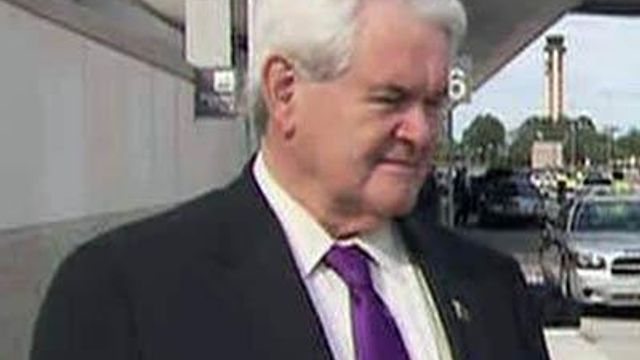Santorum suspends GOP presidential campaign
Bowing to the inevitable after an improbably resilient run for the White House, Rick Santorum quit the presidential race on Tuesday, clearing the way for Mitt Romney to claim the Republican nomination.
Posted — Updated"We made a decision over the weekend that, while this presidential race for us is over for me and we will suspend our campaign today, we are not done fighting," he said.
Santorum, appearing with his family, told supporters that the battle to defeat President Barack Obama would go on but pointedly made no mention or endorsement of Romney, whom he had derided as an unworthy standard-bearer for the GOP.
The former U.S. senator from Pennsylvania stressed that he'd taken his presidential bid farther than anyone expected, calling his campaign "as improbable as any race that you will ever see for president."
"Against all odds," he said, "we won 11 states, millions of voters, millions of votes."
Santorum signaled his intent to maintain a voice in the campaign to come, saying: "This game is a long, long, long way from over. We will continue to go out and fight and defeat President Barack Obama."
Santorum spoke with Romney before the announcement, a Republican source close to the campaign said, and Romney asked to meet him sometime in the future
The delegate totals told the tale of Santorum's demise. Romney has more than twice as many delegates as Santorum and is on pace to reach the 1,144 delegates needed to clinch the nomination by early June. Still in the race, but not considered a factor: former House Speaker Newt Gingrich and Texas Rep. Ron Paul.
Santorum had hoped to keep his campaign going through the Pennsylvania primary on April 24, but decided to fold after his severely ill 3-year-old daughter, Bella, spent the weekend in the hospital.
Santorum, a feisty campaigner who took everyone by surprise with his win in Iowa's leadoff caucuses, ran on his conservative credentials and his experience in Congress – he was a House member for four years and senator for 12 – but was hobbled by a lack of money and organization.
He said that while Romney was accumulating more delegates, "we were winning in a very different way. We were touching hearts" with a conservative message.
Gingrich, who has been campaigning in North Carolina for two days in advance of the state's May 8 primary, said he wasn't surprised by Santorum's withdrawal and congratulated him on running a good race.
"I knew that Rick was faced with some very big decisions," Gingrich told WRAL News before leaving for a Tuesday evening campaign appearance in Philadelphia. "He showed enormous courage. He came from almost nowhere in Iowa and worked very, very, very hard, but I could also feel in Michigan and Ohio and Wisconsin that the sheer weight of the Romney money machine was beginning to wear him down."
In a statement, Romney called Santorum "an able and worthy competitor" and congratulated him on his campaign.
"He has proven himself to be an important voice in our party and in the nation," Romney said. "We both recognize that what is most important is putting the failures of the last three years behind us and setting America back on the path to prosperity."
With Romney on his way to the nomination and a contest against the president, Obama's campaign manager, Jim Messina, sharply criticized Romney for waging a negative ad campaign against his opponents.
"It's no surprise that Mitt Romney finally was able to grind down his opponents under an avalanche of negative ads. But neither he nor his special interest allies will be able to buy the presidency with their negative attacks," Messina said. "The more the American people see of Mitt Romney, the less they like him and the less they trust him."
Santorum said the campaign had been "a love affair for me, going from state to state. ... We were raising issues, frankly, that a lot of people did not want raised."
He spoke almost nostalgically of the race, and of his trademark sweater vest, a pointed visual contrast to his suited rivals.
"Over and over again we were told, 'Forget it. You can't win,'" he said.
Eventually, the improbable had to bow to reality: Santorum would have needed 80 percent of the remaining delegates to win the nomination before the party's national convention in Florida in August. And that couldn't happen as long as Romney was in the race because most upcoming primaries use some type of proportional system to award delegates, making it hard to win large numbers of delegates in individual states.
In most states, Santorum's delegates can now support any candidate they choose.
Gingrich, who has been splitting the votes of those who questioned Romney's conservative credentials with Santorum, made an immediate play for his supporters.
"It's very important to have a conservative voice in the race. (Romney) has not yet won, and we have no obligation to concede anything to him," Gingrich said.
"I'd love to have (Santorum's) support," he said, noting that he previously picked up endorsements from Texas Gov. Rick Perry and businessman Herman Cain after they dropped out of the GOP race.
Santorum was the leader in a recent WRAL News Poll of likely voters in the North Carolina primary, with 34 percent support. Romney has 26 percent, and Gingrich and Paul trailed far behind.
Gingrich said he intends to campaign heavily in North Carolina, but David McLennan, a political science professor at William Peace University in Raleigh, said Santorum's departure leaves the state – and the nomination – open for Romney.
"Unless something terrible happens to the Romney campaign, Romney should walk away with North Carolina's delegates," McLennan said. "It's going to be Romney's nomination, and the other people are jockeying for position both at the convention and after the convention."
Paul also congratulated Santorum for "running such a spirited campaign" and called himself "the last – and real – conservative alternative to Mitt Romney."
Suspending the campaign allows Santorum to keep paying off nearly $1 million in debt, according to recent Federal Election Commission filings. Those debts include about $500,000 for media consulting and tens of thousands more for telemarketing and online advertising, records show.
Other presidential candidates have eventually extinguished their debt and terminated their campaigns. Former Minnesota Gov. Tim Pawlenty officially shuttered his campaign committee on Tuesday, owing as much as a half a million dollars last fall but slowly whittling that figure down.
McLennan said Santorum could retain his 285 delegates until the Republican National Convention in late August on the slim chance that Romney doesn't win a first-ballot nomination, or he could release them and let them choose whom to support.
• Credits
Copyright 2024 by WRAL.com and the Associated Press. All rights reserved. This material may not be published, broadcast, rewritten or redistributed.






